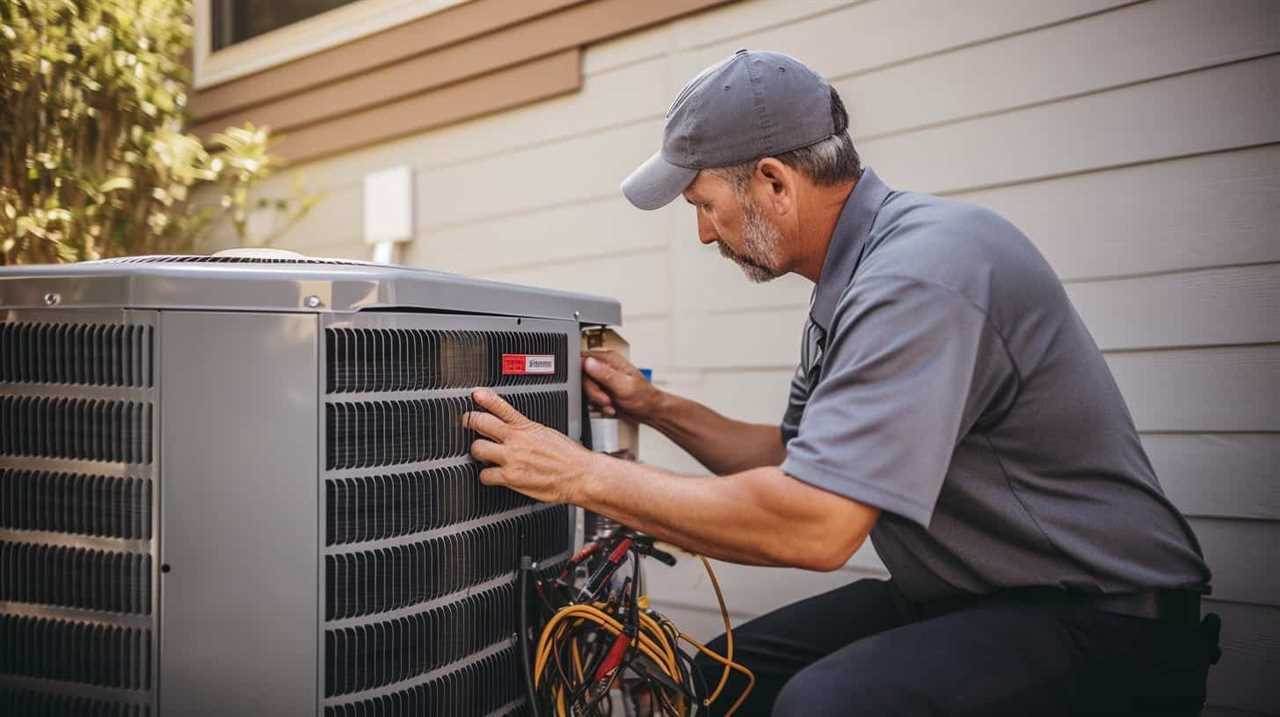
We’re here to investigate the environmental impact and effectiveness of eco-friendly heating. Traditional heating methods have a notable impact on the environment, but there is a superior alternative available.
Heat pump technology offers numerous benefits, from reducing carbon emissions to saving energy and money. In this article, we’ll delve into the energy efficiency of eco-friendly heating solutions and provide tips for choosing the right system.
Join us on this journey to uncover a greener, more sustainable approach to keeping our homes warm.
Key Takeaways
- Eco-friendly heating systems minimize harm to the environment
- Renewable energy sources and energy-saving technologies are used
- Cost-effective in the long run, despite higher installation costs
- Reduces energy consumption and lowers utility bills over time
Importance of Eco-friendly Heating
We strongly believe that using eco-friendly heating systems is crucial for reducing our environmental impact and improving energy efficiency.
Eco-friendly heating systems are designed to minimize harm to the environment by using renewable energy sources or by utilizing energy-saving technologies.
One of the key advantages of these systems is their cost effectiveness in the long run. While the initial installation cost may be higher compared to traditional heating systems, eco-friendly options can significantly reduce energy consumption and lower utility bills over time.
Moreover, government incentives play a vital role in promoting the adoption of eco-friendly heating systems. These incentives can include tax credits, rebates, and grants, which make the transition to eco-friendly heating more affordable and appealing for homeowners and businesses alike.
Environmental Impact of Conventional Heating Methods
When considering the environmental impact of conventional heating methods, it’s important to evaluate their contribution to greenhouse gas emissions and air pollution. Here are four key points to understand the environmental impact of these methods:

-
Energy consumption: Conventional heating methods, such as using fossil fuels like coal, oil, and natural gas, consume large amounts of energy. This high energy consumption leads to increased carbon emissions and contributes to climate change.
-
Carbon emissions: Burning fossil fuels for heating releases carbon dioxide and other greenhouse gases into the atmosphere. These emissions trap heat and contribute to the warming of the planet, leading to adverse effects on the environment and human health.
-
Air pollution: Conventional heating methods often release pollutants such as nitrogen oxides, sulfur dioxide, and particulate matter into the air. These pollutants can have detrimental effects on air quality, leading to respiratory issues and other health problems.
-
Environmental degradation: The extraction, transportation, and combustion of fossil fuels for heating contribute to environmental degradation through activities like mining and drilling. This can result in habitat destruction, water pollution, and loss of biodiversity.

Considering the significant environmental impact of conventional heating methods, it’s crucial to explore and adopt more eco-friendly alternatives.
Benefits of Heat Pump Technology
One of the benefits of heat pump technology is that it offers a more energy-efficient and environmentally-friendly heating option. Heat pumps work by transferring heat from one place to another, rather than generating heat through combustion like traditional heating systems. This results in significant cost savings and reduced environmental impact.
Heat pumps operate on electricity, which is typically cheaper and cleaner than other fuel sources. Additionally, heat pumps have a longer lifespan compared to conventional heating systems, making them a smart long-term investment. They require minimal maintenance and can provide both heating and cooling, eliminating the need for separate systems.
Energy Efficiency of Eco-friendly Heating Solutions
With their advanced technology and low energy consumption, eco-friendly heating solutions offer an efficient and environmentally-conscious way to heat homes and businesses. Here are four reasons why these heating solutions are energy efficient:

-
Energy Savings: Eco-friendly heating solutions, such as heat pumps and solar thermal systems, rely on renewable energy sources to generate heat. This significantly reduces reliance on fossil fuels and lowers energy consumption, leading to substantial energy savings.
-
Heat Pump Efficiency: Heat pumps are highly efficient as they transfer heat from one area to another, rather than generating heat directly. This process requires less energy compared to traditional heating systems, resulting in lower energy bills and reduced carbon emissions.
-
Solar Thermal Systems: Solar thermal systems use the sun’s energy to heat water or air, providing a renewable and cost-effective heating solution. By harnessing solar power, these systems can achieve high levels of energy efficiency and contribute to a greener future.
-
Smart Controls: Eco-friendly heating solutions often come equipped with smart controls that optimize energy usage. These controls can automatically adjust temperature settings based on occupancy, weather conditions, and other factors, ensuring efficient heating and maximizing energy savings.

Tips for Choosing the Right Eco-friendly Heating System
To ensure we make the right choice, we should consider the efficiency and environmental impact of different eco-friendly heating systems.
When choosing an eco-friendly heating system, it’s important to prioritize cost-effective options and renewable energy sources. One of the most popular options is a geothermal heat pump, which utilizes the constant temperature of the earth to provide heating and cooling. These systems are highly efficient and can save homeowners a significant amount on their energy bills.
Another eco-friendly heating option is solar heating, which uses the sun’s energy to heat water or air. Solar panels can be installed on the roof to capture sunlight and convert it into usable heat.
Biomass heating systems, which use organic materials such as wood pellets or agricultural waste, are also a renewable and cost-effective option.

Frequently Asked Questions
What Are the Potential Health Risks Associated With Conventional Heating Methods?
Potential health risks associated with conventional heating methods include poor indoor air quality, respiratory problems, and exposure to carbon monoxide. These risks contribute to a negative environmental impact and highlight the need for eco-friendly heating alternatives.
How Does Eco-Friendly Heating Technology Contribute to Reducing Greenhouse Gas Emissions?
Eco-friendly heating technology contributes to reducing greenhouse gas emissions by using renewable energy sources and promoting energy savings. It addresses concerns about climate change and offers a sustainable solution for a cleaner environment.
Are There Any Financial Incentives or Government Programs Available to Support the Adoption of Eco-Friendly Heating Systems?
Financial incentives and government programs play a crucial role in promoting the adoption of eco-friendly heating systems. They provide financial support and incentives that encourage individuals and businesses to invest in sustainable heating technologies.
Can Eco-Friendly Heating Systems Be Integrated With Existing Heating Systems?
Eco-friendly heating systems can be integrated with existing systems through retrofitting options. The energy efficiency of these systems is higher compared to conventional ones, making them a viable and sustainable choice.

How Do Eco-Friendly Heating Systems Compare in Terms of Maintenance Requirements and Costs Compared to Conventional Heating Systems?
In terms of maintenance requirements and costs, eco-friendly heating systems offer several advantages over conventional systems. They require less frequent maintenance and can help reduce long-term costs, making them a more affordable and sustainable option.
Conclusion
In conclusion, eco-friendly heating is of utmost importance in reducing our environmental impact and improving energy efficiency.
Conventional heating methods have significant negative effects on the environment, while heat pump technology provides numerous benefits.
Eco-friendly heating solutions offer a sustainable and efficient alternative for reducing energy consumption and carbon emissions.

By choosing the right eco-friendly heating system, we can contribute to a greener future and make a hyperbolic impact on preserving our planet for generations to come.









